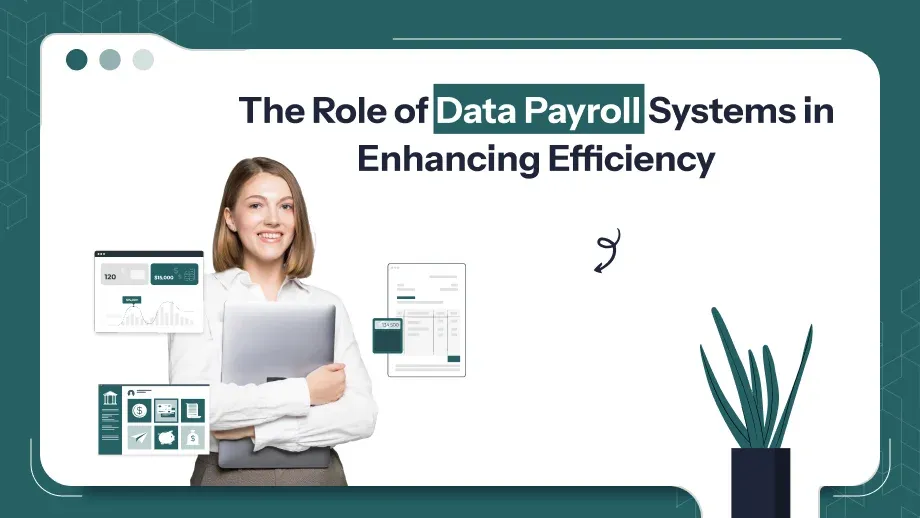
Data Payroll and payroll management today has become a critical function for all sorts of businesses in this fast world of business competition. Traditional payroll systems are being replaced with more complex and data-driven payroll solutions. This change not only enhances payroll processes in terms of efficiency and accuracy but also gives businesses tools to ensure compliance, reduce errors, and effectively manage their workforce.
Payroll datas are able to integrate very easily with time tracking system, attendance systems, and HR management systems, which streamlines operations within departments. These will also provide the crucial workforce trends, such as overtime patterns or payroll discrepancies, that a company can use to optimize resource allocation and budgeting.
What is Data Payroll?
Generally speaking, data payroll refers to integrating advanced data analytics and automated technologies in payroll processing. It is a payroll method that uses digital platforms for data collection, processing, and analysis, unlike the traditional manual payroll methods that depend on paper-based records with manual entry of data such as hours worked, overtime, bonuses, deductions, and tax information.
Data payroll systems can calculate faster, reduce the chances of errors, and provide insights that will help business owners and HR departments make informed decisions by leveraging technology.
Key Elements of Data Payroll Systems:
High-tech solutions that automate payroll, interact with other business operations, and offer immediate insight into employee remuneration are known as data systems for payroll. Together, the essential parts of data payroll systems ensure compliance, minimize human error, expedite payroll processes, and offer insightful business data. Here’s a detailed look at the key components of data payroll systems:
Data Collection & Integration
Overview: Information payroll systems are made to gather and compile a range of data on workers’ incomes, work hours, deductions, and other matters. Modern payroll service in india interface with multiple data sources and systems to streamline the procedure, as compared to older systems for payroll that call for entering data by hand.
Key Features:
- Time & Attendance Data: Payroll software systems extract data from time-tracking tools and attendance records to calculate hours worked, overtime, and shifts.
- HRIS (Human Resource Information System) Integration: Most payroll systems integrate directly with HRIS, which stores employee records such as personal information, salary structure, benefits, and tax information.
- Third-Party Software Integration: Data payroll solutions also integrate with such software as accounting systems and tax preparation software along with benefits management tools, and this way, data can be easily carried on within the organization.
Benefit: Centralized and automated collection of data by payroll systems reduces the dependency on manual inputting for data gathering, thereby reducing errors and continuously keeping all data updated.
Automated Calculations
Overview: The main advantage of payroll systems based on data is the automation. After gathering data, the system will automatically calculate many components of the payrolls such as wages, taxes, bonuses, deductions, and benefits.
Key Features:
- Calculation of Gross and Net Pay: Payroll systems calculate gross pay based on an hourly rate or salary, and then it subtracts various kinds of deductions like taxes, insurance, retirement plans, etc. for net pay.
- Tax Calculations & Withholding Accurate, in real time tax calculations for Federal, State and Local Taxes using the data for exemptions and filing status on the employees
- Overtime & Bonus: Calculations for overtime pay – frequently 1.5 times regular rate- performance bonuses and other bonuses or commission that might apply.
- This automation reduces the risk of human error, ensures timely and accurate payroll, and helps businesses remain compliant with tax laws and wage regulations.
Benefit: Centralized and automated collection of data by payroll systems reduces the dependency on manual inputting for data gathering, thereby reducing errors and continuously keeping all data updated.
Payroll Reporting and Analytics
Overview: Payroll reporting is part of the information payroll systems and represents an extremely important component because reports provide for business organizations and entities detailed analysis of payroll expenditure, tax charges, employee incomes, and even more. Organizations can produce data payroll reports on demand or analyze payroll-related trends.
Key Features:
Data Payroll Provides Customizable reports to businesses-which can offer reports based on detailed metrics such as departmental expenditure, gross/net ratios, and tax charges and more.
- Tax Filings & Compliance Reports: The payroll system generates reports automatically, thereby ensuring compliance with local, state, and federal requirements. Tax withholding, benefits, and deductions are also maintained in detailed records.
- Employee Pay Stubs & History: A self-service portal allows employees to view their pay stubs and understand how they have been paid. Data payroll systems also keep track of history, which is always available for quick reference.
Benefit : The ability to generate and review payroll reports quickly, making it easier to track labor costs and increase the transparency of it to employees, making it simpler both to report tax and undergo audits.
Compliance Management and Tax Management
Overview: Compliance with tax laws, labor regulations, and reporting requirements is a major issue for any business. A data payroll system will automate compliance management by keeping pace with changing regulations and handling all aspects of payroll taxation.
Key Features:
- Automatic Updates on Tax Rates: Federal, state, and local tax rates automatically update the data payroll systems. In this regard, the system adjusts the calculation to reflect any change without any manual intervention.
- Compliance of Rules and Regulations: Data payroll systems ensure compliance of employee benefits and wage calculations according to different labor laws including minimum wage rates, overtime rules, and family leave requirements.
- Audit-Ready Records: The system will maintain detailed and easily accessible records of all payroll-related transactions. This will lessen the potential of fines and assist you ready for audits.
Benefit: By automated compliance management, companies can guarantee that workers get paid legally while saving expensive penalties and penalties.
Employee Self-Service Portals
Overview: The majority of current payroll systems include employee self-service portals, which let employees access their paycheck data directly. The administrative load on HR departments decreases and transparency grows thanks to these online platforms.
Key Features
- Tax forms and pay stubs: Employees can download their W-2 forms, pay stubs, and other taxation-related document whenever it’s convenient for them.
- Benefit Information: Employees can also see details regarding their retirement funds, health insurance policies, and any additional perks provided by their company.
- Leave Balances: Most data payroll systems include tracking features for vacation, sick leave, and other paid time off. This makes all the balances of the employees’ available leaves clear to the employees.
Benefit: Workers have more control over their personal payroll data and HR spends less time replying to pay-related questions thanks to portals for self-service, this improves satisfaction among workers.
Data Security & Privacy
Overview: Payroll processing sensitive personal and financial data, so it requires robust data security. Data payroll systems are constructed with multiple layers of security to protect that information.
Key Features:
- Encryption: In both transit and at rest, sensitive payroll data, including social security numerals, bank account numbers, and tax information, is encrypted.
- Role-Based Access: To guarantee that only authorized individuals can view or alter critical payroll information, payroll systems provide control over access tools.
- Compatibility with Privacy legislation: To protect employee data, the majority of payroll systems adhere to local privacy regulations or data protection legislation like GDPR and Phi.
Benefit: Worker data security is improved, and their information is shielded from leaks and unauthorized access, encouraging trust and reducing the possibility of fraud or theft of information.
Scalability & Customization
Overview: A good payroll system should grow with the business. As a company expands, its payroll requirements may change; a scalable system can accommodate growth without requiring an overhaul.
Key Features:
- Flexible Pay Structures: Data payroll systems support various pay structures, such as hourly wages, salaried employees, contractors, or freelancers, allowing the system to adapt with the business changes.
- Multiple Locations or Departments: With businesses that are spread across many locations or even departments, payroll systems can handle a different tax rate, benefits, and compensation structures by location.
- Custom Workflows: Advanced payroll systems allow a business to make customized workflows as per the requirement of the specific business, approval processes, and integration with other business functions.
Benefit: Scalability and customization allow data payroll systems to adapt to growth, accommodating the changing needs of the company’s payroll without interrupting business operations.
How Data Payroll Enhances the Management of Staff ?
Real-time Insights
Real-time analytics within data payroll allow the business to achieve actionable insights related to the payrolls. Using such data allows managers to be able to promptly identify mismatches, including underclocked in or out individuals or trends involving overtime hours possibly indicating some under-staffing.
Performance Tracking
Linked payroll data to employee performance data, businesses can better see where compensation is negatively affecting productivity. Such data can inform raises, bonuses, and workforce planning decisions.
Employee Retention
The accuracy and timeliness of the payroll processing have a significant impact on the satisfaction of an employee. Someone whose paycheck reaches in time coupled with clear breakdowns and no errors is very likely to continue being engaged with his employer.
Furthermore, employee benefits and compensation data will help businesses stay abreast of the competitiveness of their offers.
Employee Engagement and Transparency
Self-service helps employees be more satisfied because it is transparent on how pay is calculated, what is deducted, and how the benefits are handled.With access to pay stubs and tax forms, the employee feels more empowered and in the know.
What is Data Protection Payroll?
Data protection payroll concerns the policies, technologies, and practices involved in safeguarding employee’s confidential data held in payroll systems against access, theft, corruption, and loss without proper authorization. It will also be about appropriate management of personal information, financial details, and data related to the employees based on the provisions in relevant laws and privacy regulations.
Payroll systems are a very important aspect of any organization since they handle sensitive information such as:
- Employee identification details, including name, Social Security number, and national ID
- Financial information, including bank account details, salary, tax withholdings, and bonuses
- Tax-related data, including income tax filings and deductions
- Health and benefit information, including insurance and retirement plan contributions
- Leave records, including vacation days and sick leave
The importance of data security for payroll
One of the more delicate operations in a company is payroll, and the information it contains is crucial for both accurate payment to employees and adherence to employment and tax regulations. Without enough information safety, companies face risk of the following:
Legal and Financial Penalties
Experiencing heavy fines and penalties may be experienced with failure to comply with certain data protection rules, among which the General Payroll Data Protection Regulation, Health Insurance Portability and Accountability Act, or state privacy regulations, may be included.
Employee Trust Erosion
A payroll breach can cause great damage in terms of employee trust. The employees are expected to feel that their privacy is secure, and payroll data not being secured will lead to dissatisfaction, low morale, and higher turn-over rates.
Reputation Damage
A breach in payroll may hurt the reputation of any firm, especially if it happens to be made public. This will reduce the confidence level of people in other departments where sensitive data is stored.
What is Data Pay Payroll?
The digital analysis and management of payroll trends using advanced systems, methods, and tools to precisely and effectively compute, distribute, and track compensation for workers is known as “Data Pay.” It is known as the Data Pay idea, which streamlines the payroll process, improves accuracy, assures conformity, and speeds up payment procedures through the use of information-driven payroll systems.
Data Pay Payroll, to put it bluntly, is the advancement of payroll management that employs data analysis, integrations, and cutting-edge technologies to handle wages, bonuses, commissions, expenses, taxes, and benefits. Data Pay systems, in contrast to typical, manual payroll processes, mainly rely on data to guarantee precise and rapid payroll processing.
How Does Data Pay Benefit Payroll Systems?
Increased Reliability and Efficiency: By automating the payroll computations, human error is reduced and the procedure is expedited.
Better Compliance: To guarantee that payroll consistently complies to local, state, and federal laws, tax laws are constantly updated.
Better Reporting and Analytics: Detailed payroll reports and analytics allow for tracking costs, trends, and employee compensation data.
Employee Transparency: The system offers self-service portals through which employees can easily access their pay stubs, earnings tracking, and update personal information.
Cost Savings: The product reduces manual processes and overhead costs and is scalable with business growth.
Conclusion
Data payroll allows companies to be more flexible regarding the compensation process of their workers, hence quicker, more efficient, and more compliant payrolls. Modern data payroll solutions make payroll transactions easier and increase efficiency, decreasing human errors because of technologies in payroll automation, cloud computing, and real-time processing. They also enable companies to extract meaningful insights for enhanced decision-making and management of staff. Data payroll also ensures that employees’ sensitive data is protected and stays compliant with data privacy laws.









